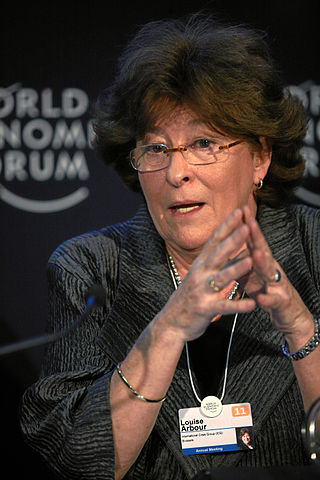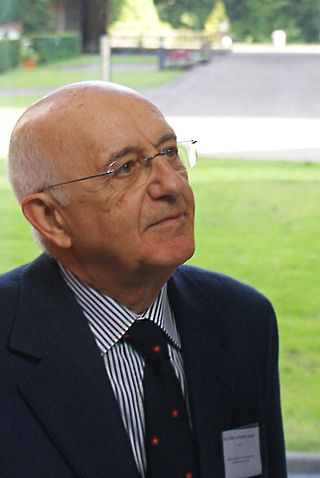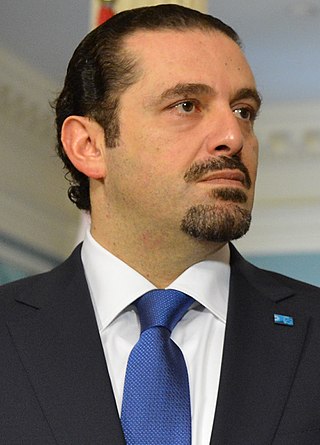Related Research Articles

Louise Arbour, is a Canadian lawyer, prosecutor and jurist.

Rafic Bahaa El Deen al-Hariri, or Rafiq al-Hariri, was a Lebanese business tycoon and politician, who served as the Prime Minister of Lebanon from 1992 to 1998 and again from 2000 until his resignation on 20 October 2004.
Neil Macdonald is a Canadian journalist with the Canadian Broadcasting Corporation, currently senior correspondent for CBC News The National.
Detlev Mehlis is the Senior Public Prosecutor in the Office of the Attorney General in Berlin. He has 30 years of prosecutorial experience and has led numerous investigations into serious, complex transnational crimes. He has been a senior public prosecutor since 1992 and has, over the course of his career, been responsible for prosecuting terrorism and organized crime cases. Most notably, he investigated the bombing on the discotheque La Belle in then West-Berlin in 1986, which claimed the life of two US soldiers and a Turkish woman, and uncovered the involvement of the Libyan intelligence service. He also proved the involvement of the terrorist Carlos and Syrian diplomats in the attack on the French culture centre Maison de France, also in West-Berlin, in 1983, as well as the involvement of Syrian intelligence services in the bombing of a German-Arab social center in Berlin in 1986. Since 1998, Mehlis has been the Chief of the Contact Office of the European Judicial Network and Coordinator for the fight against organized crime in the State of Berlin.

Antonio Cassese was an Italian jurist who specialized in public international law. He was the first President of the International Criminal Tribunal for the former Yugoslavia and the first President of the Special Tribunal for Lebanon which he presided over until his resignation on health grounds on 1 October 2011.

The Special Tribunal for Lebanon (STL), also referred to as the Lebanon Tribunal or the Hariri Tribunal, is a tribunal of international character applying Lebanese criminal law under the authority of the United Nations to carry out the investigation and prosecution of those responsible for 14 February 2005 assassination of Rafic Hariri, the former Lebanese prime minister, and the deaths of 21 others, as well as those responsible for connected attacks.
Daniel David Ntanda Nsereko is a Ugandan judge and legal scholar. He was a member of the Appeals Chamber of the International Criminal Court (ICC) from 2008 to 2012, and currently serves as a judge on the Special Tribunal for Lebanon.
The United Nations International Independent Investigation Commission (UNIIIC) was established on 7 April 2005 by Security Council Resolution 1595 to investigate the assassination of former Prime Minister of Lebanon, Rafic Hariri, who had been killed in Beirut on 14 February 2005.

Al Jadeed is an independent Lebanese TV station. Based in Beirut, it is one of the leading TV channels in Lebanon. It was launched in 1992 and closed in 1997 due to Syrian intervention, and then relaunched in 2001 during a luxurious celebration attended by prominent figures. Al Jadeed today is considered one of the 3 leading TV channels in Lebanon.
David Tolbert currently serves as the third president of the International Center for Transitional Justice, a global human rights organization with headquarters in New York.

On 9 November 2009, after five months of negotiations following the 2009 parliamentary elections, Lebanese prime minister Saad Hariri formed a national unity government.

On 14 February 2005, former Prime Minister of Lebanon Rafic Hariri was killed along with 21 others in an explosion in Beirut, Lebanon. Explosives equivalent to around 1,000 kilograms of TNT were detonated as his motorcade drove near the St. George Hotel. Among the dead were several of Hariri's bodyguards and former Minister of the Economy, Bassel Fleihan.
Content from the United States diplomatic cables leak has depicted the United States' opinion of the Middle East-related subjects extensively. WikiLeaks has published these classified documents, diplomatic cables, between the United States Department of State and its diplomatic missions around the world. Many previously unknown statements or opinions about a variety of Middle Eastern topics have been revealed.

United Nations Security Council resolution 1595, adopted unanimously on 7 April 2005, after recalling its support for the sovereignty, territorial integrity and independence of Lebanon, the council established a commission to assist Lebanese authorities in their investigation of the assassination of former Prime Minister Rafic Hariri in Beirut on 14 February 2005.

United Nations Security Council Resolution 1664 was adopted unanimously on March 29, 2006; after recalling resolutions 1595 (2005), 1636 (2005) and 1644 (2005), the Council requested the Secretary-General Kofi Annan to consult with the Lebanese government concerning the establishment of an international tribunal to try those responsible for the assassination of Prime Minister Rafic Hariri and 22 others in February 2005.

The formation of a new government led by Najib Mikati follows five months of negotiations after the fall of the Saad Hariri government. Mikati formed a controversial 30-minister cabinet. Following ruptures and tensions and two previous threats to resign, Mikati finally resigned on 23 March 2013. Tammam Salam was tasked to form a new government on 6 April 2013.

United Nations Security Council Resolution 1786 was unanimously adopted on 28 November 2007.
United Nations Security Council Resolution 1852 was unanimously adopted on 17 December 2008.

Jamil Al Sayyed is a Lebanese politician, a current Member of the Parliament of Lebanon, and the former head of Lebanon's Sureté Générale or Lebanese General Security Directorate. He was detained according to a law he drafted himself, and released after four years, from 2005 to 2009 due to his alleged involvement in the assassination of former Lebanese prime minister Rafik Hariri. He was released on 29 April 2009 due to "inconsistencies in the statements of key witnesses and of a lack of corroborative evidence to support these statements and to the fact that some witnesses had modified their statements and one key witness had expressly retracted his original statement incriminating the persons detained". On August 18, 2020, the Special Tribunal for Lebanon declared officially in his final judgment on Hariri assassination case that Jamil Sayyed was illegally detained for four years by violation of the international law, and that the United Nations (UN) should compensate him and apologize publicly for his illegal detention, and that the Lebanese authorities should do the same. He was never charged with a crime. He is also a recipient of many International orders and decorations, notably the French Légion d'Honneur, at the grade of “Commandeur”.
Ali Al Hajj is the former major general and director of the Lebanese Internal Security Forces.
References
- ↑ "Statement by Daniel A. Bellemare, Prosecutor of the STL, to the People of Lebanon". stl-tsl.org. Retrieved 2018-04-11.
- ↑ "Secretary-general names Canada's Daniel Bellemare commissioner of international independent commission, prosecutor of Special Tribunal for Lebanon". United Nations Secretary General. Retrieved 4 January 2011.
- ↑ Ayed, Nahlah (2 February 2009). "Will the Canadian get his man?". CBC News. Retrieved 4 January 2011.
- ↑ "Daniel A. Bellemare - Biography". Special Tribunal for Lebanon (U.N.). Retrieved 2011-01-04.
- ↑ Potter, Mitch (Nov 21, 2010). "UN had evidence linking Hezbollah to murder of Lebanese PM: CBC". Toronto Star. Retrieved 2010-12-12.
- ↑ "WikiLeaks reveals frustrations over UN Hariri probe". The National. Dec 10, 2010. Retrieved 2011-01-04.